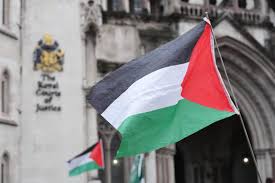LONDON — Britain’s High Court ruled Friday that the ban on Palestine Action as a terrorist organization is unlawful.
The organization’s co-founder Huda Ammori successfully challenged the British government’s decision to proscribe Palestine Action under the Terrorism Act 2000 after three judges, led by Victoria Sharp, said ministers acted unlawfully.
Membership or support of the group was made illegal last July and punishable by prison sentences of up to 14 years.






